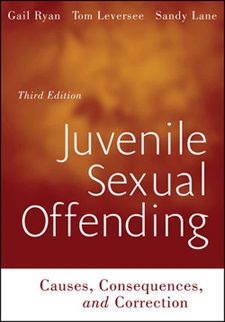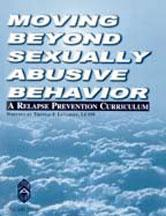Juvenile Sexual Offending: Causes, Consequences, and Correction, 3rd Edition | Wiley (2010)
 By Gail Ryan, Tom Leversee and Sandy Lane
By Gail Ryan, Tom Leversee and Sandy Lane
The new edition of Juvenile Sexual Offending provides a research-based, goal-oriented approach to the assessment, treatment, supervision, and care of this difficult population.
Written by leading specialists in the field, the Third Edition represents the tremendous strides in research on brain growth and development. A thorough overview of the process of risk evaluation is included, as well as detailed and practical guidelines on gauging the possibility of repeated offense. Also included:
- New chapters on legislative and policy developments; risk assessment; adult responsibilities; and outcomes pairing risk management with health promotion
- Greatly expanded coverage of treatment, including new chapters on abuse-specific and offense-specific treatment interventions, and the effects of trauma
- Practitioner-friendly guidance to help mental health professionals with decision making; program development; case management skills; and working within multidisciplinary teams
Juvenile Sexual Offending, Third Edition helps mental health professionals, child welfare, law enforcement, and juvenile justice professionals move toward successful assessment and treatment of juveniles who sexually abuse, reducing the risk of sexual abuse in future generations.
Moving Beyond Sexually Abusive Behavior: A Relapse Prevention Curriculum (2002 – Out of Print)
 This curriculum is a comprehensive guide and manual for therapists on how best to teach Relapse Prevention to adolescents. It builds an unambiguous, strong structure for making clear the lesson of permanently stopping sexually abusive behaviors. The curriculum sets a foundation; identifies internal and external factors that increase risk; recognizes new coping skills; and outlines the requirements of external supervision during transition and aftercare.
This curriculum is a comprehensive guide and manual for therapists on how best to teach Relapse Prevention to adolescents. It builds an unambiguous, strong structure for making clear the lesson of permanently stopping sexually abusive behaviors. The curriculum sets a foundation; identifies internal and external factors that increase risk; recognizes new coping skills; and outlines the requirements of external supervision during transition and aftercare.
Moving Beyond: Relapse Prevention Student Manual (Out of Print)
In Moving Beyond, Tom Leversee has upgraded and revised traditional approaches to enhance the teaching of Relapse Prevention to adolescents. Clear goals and strong structure provide a firm grounding for young people dealing with their sexually abusive behaviors. With no sense of being talked down to, adolescents begin learning their relapse chains and what goes into relapse prevention plans from the first page.
Book Chapters
Leversee, T. (2017). Etiology and Typology of Juveniles Who Have Committed Sexual Offenses. Sex Offender Management Assessment and Planning Initiative. Washington, DC: National Criminal Justice Association, Office of Justice Programs (SMART), U.S. Department of Justice, p. 227-327.
Co-chair of the Adolescent Practice Guidelines committee that drafted the “ATSA Practice Guidelines for Assessment, Treatment, and Intervention with Adolescents Who Have Engaged in Sexually Abusive Behavior 2017”– reviewed and approved by the ATSA membership and ATSA Board
Leversee, T. (2017). Providing Differential Treatment and Supervision to the Diverse Population of Adolescents who have Engaged in Sexually Abusive Behavior. In Schwartz, B. (Ed.), Sexually Abusive Behavior in Youth: A Handbook of Theory, Assessment, and Treatment. Kingston, N.J. Civic Research Institute, Inc.
Leversee, T. & Powell, K. (2017). Beyond Risk Management to a more Holistic Model or Treating Adolescents who have Engaged in Sexually Abusive Behavior. In Schwartz, B. (Ed.), Sexually Abusive Behavior in Youth: A Handbook of Theory, Assessment, and Treatment. Kingston, N.J. Civic Research Institute, Inc.
Leversee, T. (2011). Understanding and Applying Typologies in the Context of a Holistic Model for the Treatment of Sexually Offending Juveniles. Contemporary Practice with Young People who Sexually Abuse. In Calder, M. (Ed.). Holyoke, MA: NEARI press.
Leversee, T. (2007) Using Typologies to Individualise the Assessment, Treatment, and Supervision of Sexually Abusive Youth. In Calder, M. (Ed.). Children and Young People who Sexually Abuse: taking the field forward. Lyme Regis, Dorset, Russell House Publishing, 38-52.
Articles
Leversee, T. & Pearson, C. (2001) Eliminating the Pendulum Effect: A Balanced Approach to the Assessment, Treatment, and Management of Sexually Abusive Youth. Journal of the Center for Families, Children, & the Courts Vol. 3, 45-57.
Leversee, T. (1993) Increasing Staff Competence: A Clinical Supervision Model. INTERCHANGE: Cooperative Newsletter of the Adolescent Perpetration Network. Denver, CO. C. Henry Kempe National Center for the Treatment and Prevention of Child Abuse and Neglect